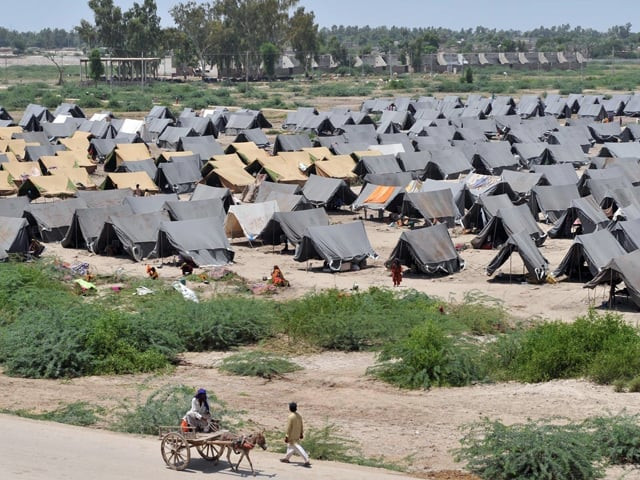IDPs in need: If they can’t come to camps, then the camps can come to them
Danish government supplies food to over 1,100 displaced families near Jalozai camp.

IDPs in need: If they can’t come to camps, then the camps can come to them
According to the statement, the government of Denmark, through its implementing partners DanChurchAid (DCA) and Church World Service (CWS), has completed a project to supply food for a month to over 1,100 displaced families in three union councils of Peshawar district: Sheikh Muhammadi, Surizai Payan and Badher. The food packages were designed to meet the average family’s daily intake needs of 2,100 kilocalories from fats and proteins.
Internally Displaced Persons (IDPs) who live far from the Jalozai refugee camp were targeted in the campaign, as they have been facing issues in reaching down to the camp to get assistance. Wolffhechel explained that many IDPs cannot bear the financial cost of travelling to the food distribution camps, nor are the women, who head their households, able to travel alone. “They are more at risk of food insecurity without external assistance, which is why they were our focal point for this distribution process,” he said.
The families fled their homes due to militant conflicts in their areas and are expected to be displaced for six to nine months.
DCA Emergency Coordinator Kristian Pedersen said that many people have been forced out of their homes without any belongings other than what they could bear or wear. The families are not able to travel long distances to reach official distribution points and that is why the food assistance is so important, the official said. A total of US$135,000 from Danida’s Emergency Response Fund have been used to assist the displaced persons.
“These families are living in very poor conditions without sufficient access to food, shelter, health, water and sanitation,” said CWS Coordinator Rabia Sabri. She said that the food distribution was done in the most dignifying manner, with special emphasis on preserving the dignity of women, the disabled, and the elderly.
The coordinator added that CWS and DCA were the first organisations to assist off-camp IDPs.
The Government of Denmark’s development agency, Danida launched its first phase of long-term development cooperation with Pakistan in 2010, where Denmark is contributing US $28 million for democratic development, regional stability, human-rights, and gender equality.
Denmark has also previously supported Pakistan with humanitarian assistance both during the earthquake and the floods in 2010-11, where Denmark contributed a total of US $30million for flood relief.
Published in The Express Tribune, June 4th, 2012.













COMMENTS
Comments are moderated and generally will be posted if they are on-topic and not abusive.
For more information, please see our Comments FAQ